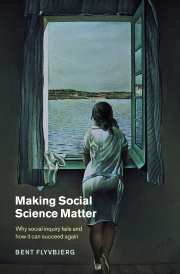4 - Context counts
from Part one - Why social science has failed as science
Published online by Cambridge University Press: 05 June 2012
Summary
[P]ractice has a logic which is not that of logic.
Pierre BourdieuThe deadly paradox of social theory
Hubert Dreyfus and Pierre Bourdieu argue that the study of individuals and society can never be “normal” in the Kuhnian sense because of the relationship between ideal scientific theory on the one hand and human activity on the other. The limitation on “normality,” according to Dreyfus and Bourdieu, lies not in the historically contingent definition of “man,” as Foucault asserts, but more generally, in problems with establishing theories about the social world which parallel natural-science theories; and more specifically, for social science in problems with explaining and predicting social activity using abstract, context-independent elements. Let us examine Dreyfus's and Bourdieu's argument from its foundation. The argument is clearer than other arguments about the status of the social sciences and it has wide-ranging consequences for our understanding of what these sciences can and cannot be.
Dreyfus's first step is to make clear what he understands by ideal “theory.” He goes back to Socrates, whom he regards as the founder of that unique intellectual activity called theorization. Ideal theory is viewed by Dreyfus as having six basic characteristics that can never be fully realized, but can be approached to varying degrees. Socrates introduced and argued for the first three of these when he said that a theory must be (1) explicit, (2) universal, and (3) abstract.
Information
- Type
- Chapter
- Information
- Making Social Science MatterWhy Social Inquiry Fails and How it Can Succeed Again, pp. 38 - 50Publisher: Cambridge University PressPrint publication year: 2001
